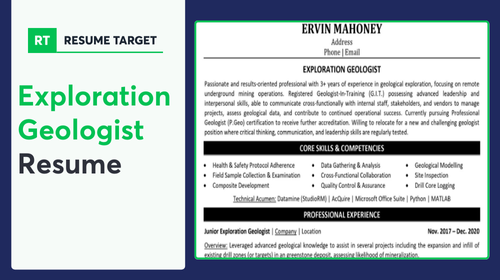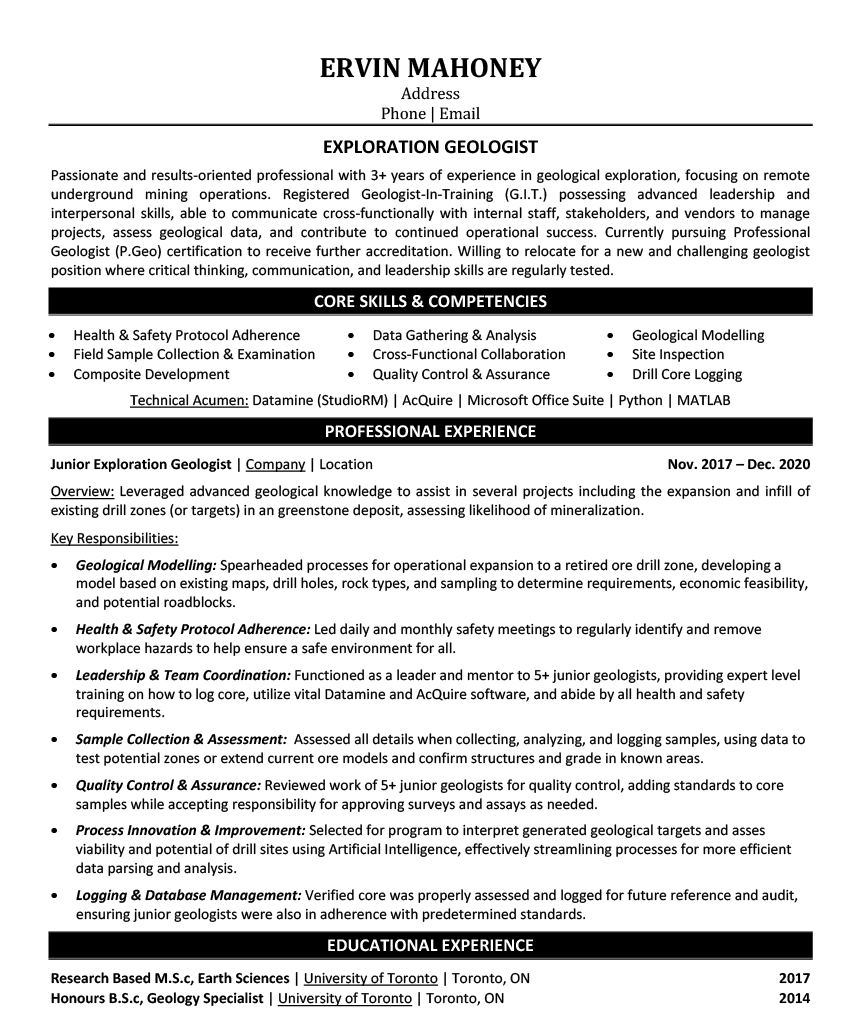

Rock samples and core logs tell clear stories, but most exploration geologist resumes read like dry technical reports. Your field experience and discovery potential get buried under basic job descriptions.
Are you struggling to translate your geological expertise into compelling resume content? You need a document that showcases both your technical skills and your ability to find valuable deposits that drive company success.
Resume Target specializes in helping exploration geologists stand out in a competitive field. We transform your technical achievements and field experience into powerful success stories that catch the attention of mining companies and exploration firms.

As modern-day treasure hunters of the earth's resources, Exploration Geologists are the first boots on the ground in the search for vital mineral, oil, and gas deposits that power our world.
Your work as an Exploration Geologist combines traditional field techniques with cutting-edge technology, as you analyze rock formations, conduct geophysical surveys, and interpret complex geological data to pinpoint promising resource locations that could be worth millions in untapped potential.
Whether you're scaling remote mountainsides or using sophisticated 3D modeling software, the career path of an Exploration Geologist offers incredible variety and growth opportunities, with chances to advance from field work to project management and executive positions in resource companies worldwide.
Let's talk about what's exciting in the world of Exploration Geology! Your career path as an Exploration Geologist offers compelling earning potential that grows significantly with your expertise and experience. And guess what? The field rewards your professional development through certifications, specialized skills, and advanced education.
Figures from: Salary.com
From entry-level field work to leading geological exploration projects, your career path as an Exploration Geologist offers diverse opportunities for growth through specialized expertise and project leadership.
Beyond basic geological knowledge, advancing in this field requires mastery of advanced technical tools and leadership capabilities.
- GIS and geological modeling software proficiency - Advanced remote sensing technology expertise - Field mapping and data analysis mastery - Project management and team leadershipLaunch your exploration geology career by gaining hands-on field experience through entry-level positions like geological technician or field assistant, while pursuing advanced education in geology or earth sciences.
To advance in this dynamic field, you'll need to develop key technical abilities including strong analytical and problem-solving skills, along with practical experience working in challenging environments.
Requirements from Pulivarthi Group
From energy hubs to consulting firms, exploration geologists find opportunities across diverse regions and sectors.
Figures from LinkedIn Jobs
Struggling to translate your field experience, geological surveys, and technical expertise into a compelling exploration geologist resume that catches a hiring manager's attention? Follow our comprehensive, section-by-section guide that will help you map out a professional resume as methodically as you map geological formations.
If you're like most exploration geologists, translating your complex field experience and technical expertise into a compelling resume summary can feel as challenging as interpreting a complex stratigraphic sequence.
While you excel at analyzing geological data and identifying promising mineral deposits, capturing your unique combination of field skills, analytical abilities, and project management experience in just a few sentences requires a strategic approach that resonates with hiring managers.
How would you characterize your expertise balance between field exploration techniques and analytical/laboratory methods in your geological career?
Reason: This helps frame your professional identity and showcases the full spectrum of your geological capabilities, which is crucial for employers looking for well-rounded exploration geologists.
What types of geological environments and commodity groups have shaped your exploration experience, and how does this breadth of exposure set you apart?
Reason: This question helps articulate your versatility and specialized knowledge areas, allowing you to position yourself effectively for specific exploration projects or companies.
How would you describe your approach to integrating traditional geological methods with modern exploration technologies and data analysis in your work?
Reason: This highlights your adaptability and contemporary relevance in the field, showing potential employers you can bridge classical geological expertise with modern exploration techniques.
As an exploration geologist, your skills section needs to demonstrate both your technical expertise in geological analysis and your practical field experience, while highlighting specialized software proficiency and analytical capabilities.
From advanced skills like seismic interpretation and resource estimation to fundamental abilities like core logging and sample analysis, your resume should showcase the full spectrum of geological competencies that make you valuable to mineral or petroleum exploration companies.
Showcase your geological expertise by organizing your experience into three powerful sections: a concise role overview that sets the stage, quantifiable achievements that highlight your discoveries and field successes, and core responsibilities that demonstrate your technical and analytical capabilities in mineral exploration.
Many exploration geologists struggle to translate complex technical fieldwork and analytical findings into clear, business-focused accomplishments that executives understand. Transform your geological discoveries and research into compelling metrics by connecting field success rates, resource identification, and cost-efficient exploration strategies to bottom-line company growth.
The responsibilities section demonstrates how Exploration Geologists contribute to mineral and resource discovery beyond basic fieldwork. Your duties should clearly show both technical expertise and business impact while explaining complex geological work in terms that hiring managers can understand.
Your geology credentials and specialized training are crucial for demonstrating your expertise in mineral exploration and field mapping. Start with your highest geology degree and include any professional registrations or certifications that showcase your competency in core logging, geochemical sampling, and resource estimation.
Now that you've built a strong foundation using Resume Target's proven resume writing guidelines, you're ready to transform your resume into a powerful tool for landing your ideal exploration geology position.
While many geologists make the mistake of using the same resume for every application, successful candidates know that personalizing their resume for each position is just as crucial as customizing their cover letter.
By carefully aligning your exploration geology experience and technical skills with each job description, you'll not only satisfy ATS requirements but also demonstrate to hiring managers that you understand their specific exploration needs and geological challenges.
Ready to make your resume stand out from the crowd? Let's turn your experience into a compelling story that makes you the clear choice for your target exploration geology role!
Don't let a lack of field experience hold you back from launching your career as an Exploration Geologist! Your geology degree, lab work, and field camp experiences can create a compelling story that showcases your potential.
Focus on highlighting your geological mapping skills, analytical abilities, and any research projects you've completed during your studies.
For a detailed roadmap to crafting your resume, check out the Student Resume Writing Guide to ensure you're including all the essential elements that employers look for in entry-level geologists.
Your geology degree and fieldwork experience are powerful assets that deserve to shine in your resume summary - let's showcase them with confidence!
Focus on highlighting your research projects, mapping skills, and any hands-on experience from field camps or internships to create an impactful first impression.
"Detail-oriented and field-experienced Exploration Geologist with comprehensive academic training and 2+ years of geological mapping and sample analysis experience. Proficient in GIS software, core logging, and geochemical sampling techniques through multiple field research projects. Demonstrated strong analytical abilities through undergraduate thesis on regional stratigraphy and structural analysis. Seeking to leverage strong technical foundation and passion for discovery to contribute to mineral exploration initiatives at a dynamic mining company."
Now's your chance to showcase the rigorous academic foundation that prepared you for discovering Earth's hidden resources - turn those geology courses and field experiences into compelling content that catches employers' attention!
Don't just list your degree - highlight specialized coursework like "Advanced Mineralogy"or "Structural Geology,"and feature those mapping projects and field studies that demonstrate your practical skills in geological interpretation and analysis.
1. Common courses for a degree/certification for Exploration Geologists include field geology, physical geology, mineralogy, petrology/petrography, structural geology, stratigraphy/sedimentology/soils, and hydrogeology [1] [2].Relevant Coursework: Field Geology | Physical Geology | Mineralogy | Petrology/Petrography | Structural Geology | Stratigraphy/Sedimentology
Key Projects:
Geological Mapping Project: Conducted comprehensive field mapping and analysis of a complex geological terrain to identify potential mineral deposits and structural features. Created detailed geological maps and cross-sections using modern mapping techniques and software.
Mineral Exploration Assessment: Led a team of four students in evaluating potential gold mineralization in a greenfield site using multiple exploration techniques and data integration methods.
Leverage your academic background, field experience, and technical training by showcasing the specialized geological skills you've developed through coursework, research projects, and hands-on fieldwork to create a compelling skills section that catches employers' attention.
As an entry-level Exploration Geologist, your combination of technical knowledge and practical field skills positions you well for a career in mineral exploration, with excellent opportunities for growth and advancement in both field and research positions.
When you're deep in the technical details of geological surveys and mineral exploration, it can feel impossible to translate your field expertise and complex analytical skills into language that resonates with hiring managers.
At Resume Target, we specialize in crafting resumes for exploration geologists that bridge the gap between technical fieldwork and corporate value, having helped countless geologists showcase their discoveries and analytical achievements.
Our deep understanding of the geology sector means we know exactly how to position your experience with mapping, sampling, and resource estimation in ways that capture attention.
With exploration budgets increasing and new projects launching across the mining sector, now is the perfect time to transform your technical expertise into a compelling career story - let's connect for a free consultation today.
Impress any hiring manager with our Geology resume writing service. We work with all career levels and types of Geology professionals.
Learn More → Geology Resume Writing Services